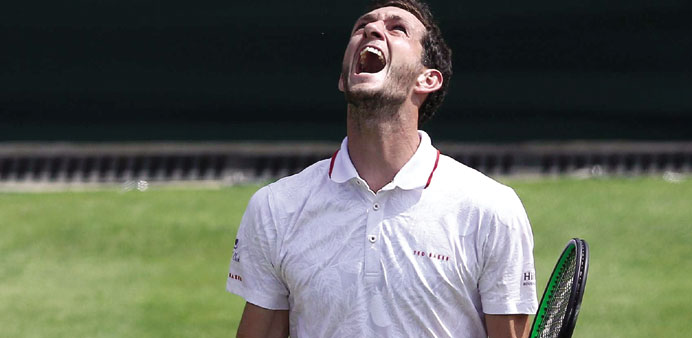Britain’s James Ward celebrates after beating Czech Republic’s Jiri Vesely in the second round of the Wimbledon at The All England Tennis Club in Wimbledon, southwest London, yesterday. (AFP)
AFP/London
James Ward admitted he was relieved to finally silence the critics after the British wildcard made it to the Wimbledon third round for the first time. World number 111 Ward upset the form-book with a 6-2, 7-6 (7/4), 3-6, 6-3 victory over highly-rated Czech youngster Jiri Vesely yesterday.
Ward’s surprise success against the world number 45 was followed shortly after by Andy Murray’s demolition of Robin Haase, meaning there will be two British men in Wimbledon’s third round for the first time since Tim Henman and Greg Rusedski in 2002. And with Heather Watson already through to the third round of the women’s event, where she faces world number one Serena Williams, there are now three Britons in the last 32 for the first time since 1999.
Ward was proud to play a part in bolstering the reputation of British tennis, which, despite Murray’s impressive feats, is often regarded as something of a joke in his own country. But the 28-year-old son of a London taxi driver, who had never before made it past the second round of a Grand Slam, was even more satisfied to provide a riposte to the doubters who claim he has failed to make the most of his potential
“A lot of people can get off my back now. The third round of Wimbledon is great, I can’t put it into words,” Ward said. “Obviously, a lot of stuff gets written about you in the press, why couldn’t you win in Davis Cup, why can’t you win every other week.
“It’s not as easy as that. There’s a lot of good players out there. So it’s great for British tennis that more people are winning matches and doing well.”
Ward, who next faces Canada’s Vasek Pospisil, did concede there was still room for improvement for British players not named Murray. “It’s difficult because we are one of the richest nations. People expect better results, as we all do,” he said. “But it’s not for a lack of trying. Everyone is training as hard as the other guys.”
Ward benefitted from the pre-tournament withdrawal of world number eight David Ferrer, who had been his scheduled first round opponent. But his confident display against Vesely underlined the ability he showed in a five-set victory over John Isner of the United States while for Britain’s Davis Cup team earlier this year.
His Davis Cup contributions have brought him closer to Murray over the last 18 months. “It’s always a good help spending time with him at Davis Cup and off-season as well, which I’ve been lucky enough to do. Good habits rub off on you if you spend enough time around someone,” Ward said.
“He’s just a good friend above all. We get on really well. We have a lot of the same interests as well outside of tennis.”
Murray was delighted to see his friend making a name for himself at last. “I’ve spent a lot of time with him over the last 12, 18 months really,” he said. “I watch a lot of his matches online when he’s playing Challengers and stuff. I kind of say, Well done, or let him know what I thought about the match, anything like that. See if I can help in any way.”
Ward may have quashed the abuse from the British public and media, but silencing a perfectionist like former Wimbledon champion Murray could be harder. “He has the ability to compete at this level. He just needs to find a way to do it on a weekly basis,” Murray said.
“That’s the challenge for him. You earn the right to do that throughout the course of the year.”

